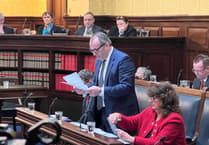Thousands of average earners are set to pay more pay more tax as Treasury Minister Dr Alex Allinson battles to get government finances back on track.
Delivering his second annual Budget this week, Dr Allinson announced that the higher rate of personal income tax will rise from 20% to 22% in April, the forecast £20m extra income this will raise being ringfenced for the island’s healthcare services.
The move, which the Treasury Minister insists is temporary, will hit almost 39,300 taxpayers, many of whom are already feeling the squeeze of the cost of living crisis.
It’s the first rise in personal income tax rise since 2010-11, when the upper rate rose from 18-20% following the UK’s revision of the VAT revenue sharing arrangement.
The Budget announcement will mean someone on a median wage of £673 a week (£34,996 a year) paying an extra £194.12 a year in income tax and National Insurance.
A single person earning £48,000 a year will pay £761.40 more in taxes while a couple earning £80,000 between them will pay an extra £588.40.
A jointly assessed couple earning £208,000 between them will see their net income drop by just under £4,000 while a self-employed person with annual profits of £50,000 will pay £812.96 more in taxes and a self-employed worker making £75,000 with see their net income fall by £1,312.96.But a single person on minimum wage of £10.75 an hour and with annual earnings of £20,683 will be £85.80 a year better off.
Dr Allinson told Isle of Man Today: ‘We’ve gone through a period of high inflation and increased public spending but also increased demand for services such as healthcare.
‘What we are doing is balancing that by increasing the upper rate of income tax and ringfencing that for healthcare so we can continue to invest in our NHS.
‘Its an extremely difficult decision and I apologise for having to do this.
‘It’s absolutely essential that we maintain high quality public services but to do that we need to grow our economy and in the short-term we need to increase taxation to balance the books rather than constantly drawn down on reserves.
‘At the same time what we are trying to do is make sure that departmental spending is kept under control, that departments are far more efficient, that they provide value for money and they spend the money that taxpayers give them in the best way possible for our future.’
But he admitted there were risks with raising tax.
Dr Allinson said: ‘When you look at our wider demographics there are lots of people on median earnings but they are low so by not changing the thresholds we are taking more tax from those people who are on what many people see as being on average income, £40,000-£50,000 a year.
‘It’s absolutely imperative that they see the result of that in terms of better healthcare services, better education, better government services. But there is a risk there.
‘That’s why I’ve been at pains to say this is a transitional, temporary increase in taxation.’
As part of a forthcoming tax strategy, Treasury is proposing to create a standalone annual NHS levy.
This aims to replace the 2% tax increase and also apply to residents who do not pay income tax in the Isle of Man.
The income tax personal allowance remains at £14,500 for individuals and £29,000 for jointly assessed couples, and the 10% band stays fixed at £6,500.
Company tax on some banks and large retailers will be also increased, from 10% to 15%.
The 15% rate will only apply to banks and retailers whose profits would otherwise be subject to a top-up tax outside the island.
A Petroleum Extraction Tax will also be brought forward, with the Manx government taxing income from petroleum operations in the island, including its territorial sea, at a 20% rate from April.
Some 3,500 individuals and families of working age on low incomes will benefit from increases in Employed Person’s Allowance, Income Support and income-based Jobseeker’s Allowance.
And around 3,000 families who have more than one dependent child will see their Child Benefit significantly increased.
MORE FROM THE BUDGET 2024


.jpeg?width=209&height=140&crop=209:145,smart&quality=75)
-(3).jpeg?width=209&height=140&crop=209:145,smart&quality=75)
Comments
This article has no comments yet. Be the first to leave a comment.